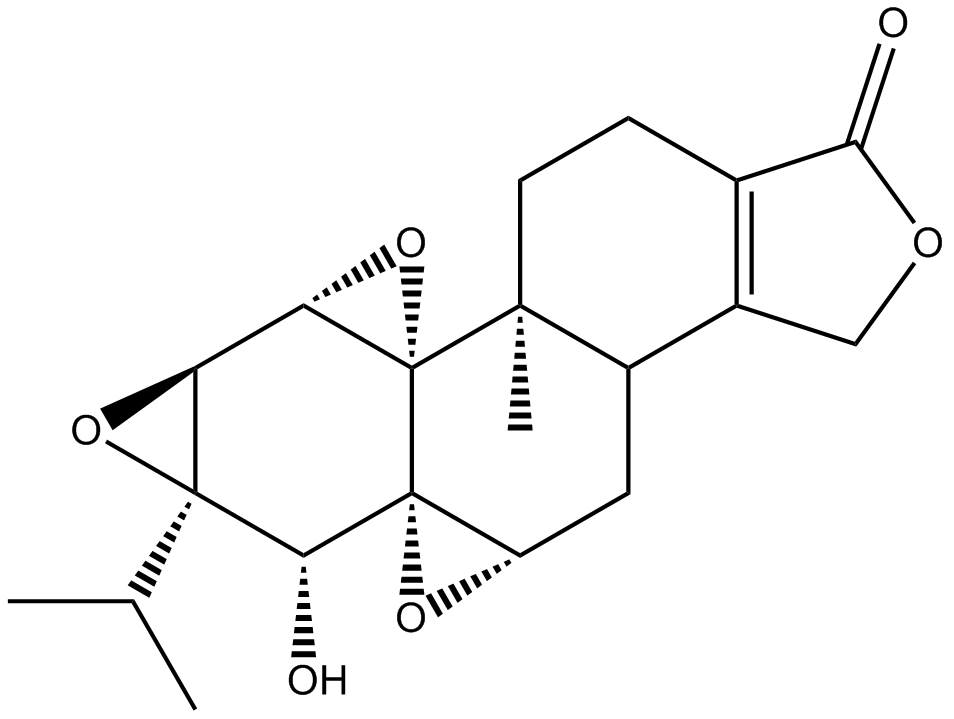Triptolide (Synonyms: NSC 163062, PG 490) |
| رقم الكتالوجGC14402 |
Triptolide is a diterpenoid triepoxide extracted from the root of Thunder God Vine, acting as an inhibitor of NF-κB activation. NF-κB is a family of transcription factor protein complexes.
Products are for research use only. Not for human use. We do not sell to patients.

Cas No.: 38748-32-2
Sample solution is provided at 25 µL, 10mM.
Triptolide is a diterpene triepoxide isolated for the first time from the medicinal plant Tripterygium wilfordii, exhibiting immunosuppressive, anti-inflammatory, anti-proliferative, and antitumor effects. It acts as an inhibitor of NF-κB activation, where NF-κB is a family of transcription factor protein complexes[1]. Triptolide possesses broad-spectrum anticancer activity, inhibiting the development of colon cancer, breast cancer, renal cell carcinoma, and cervical cancer[2].
In vitro, triptolide (50 nM, 72 h) significantly inhibits the proliferation of ovarian cancer cells SKOV3 and A2780. Triptolide (15 nM, 48h) significantly inhibits cell migration and blocks the invasive capability of cells[2]. Triptolide (50-200 nmol/L) incubated with PANC-1 and MiaPaCa-2 cells significantly reduces cell viability without affecting the viability of normal pancreatic ductal cells[3]. The IC50 value of triptolide on RSF cell viability is 74.3 nM, and its IC50 value on RSF cell proliferation is 20.4 nM[4]. Triptolide (0-150 nM) significantly inhibits the viability of HK1, FaDu, and C666-1 cells in a dose- and time-dependent manner[5].
In vivo, treatment with triptolide (1 mg/kg/d, p.o.) for three weeks in nude mice reduced the number of metastatic nodules by approximately 80%[2]. Triptolide (0.2 mg/kg/d) administered to mice with transplanted pancreatic tumors for 60 days reduced pancreatic cancer growth and significantly decreased local tumor spread[3].
References:
[1] Zhang W, et al. Triptolide Combined with Radiotherapy for the Treatment of Nasopharyngeal Carcinoma via NF-κB-Related Mechanism. Int J Mol Sci. 2016 Dec 19;17(12).
[2] Zhao H, Yang Z, Wang X, et al. Triptolide inhibits ovarian cancer cell invasion by repression of matrix metalloproteinase 7 and 19 and upregulation of E-cadherin[J]. Experimental & molecular medicine, 2012, 44(11): 633-641.
[3] Phillips P A , Dudeja V , Mccarroll J A ,et al.Triptolide Induces Pancreatic Cancer Cell Death via Inhibition of Heat Shock Protein 70[J].Cancer Research, 2007, 67(19):9407.
[4] Kusunoki N, Yamazaki R, Kitasato H, Beppu M, Aoki H, Kawai S: Triptolide, an active compound identified in a traditional Chinese herb, induces apoptosis of rheumatoid synovial fibroblasts. BMC Pharmacol 2004, 4:2.
[5] Cai J, et al. Natural product triptolide induces GSDME-mediated pyroptosis in head and neck cancer through suppressing mitochondrial hexokinase-ΙΙ. J Exp Clin Cancer Res. 2021;40(1):190. Published 2021 Jun 9.
Average Rating: 5 (Based on Reviews and 30 reference(s) in Google Scholar.)
GLPBIO products are for RESEARCH USE ONLY. Please make sure your review or question is research based.
Required fields are marked with *




















